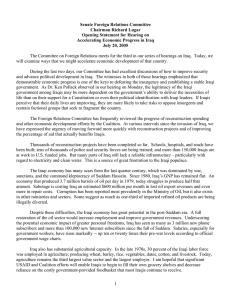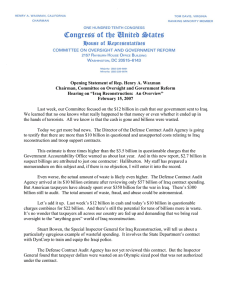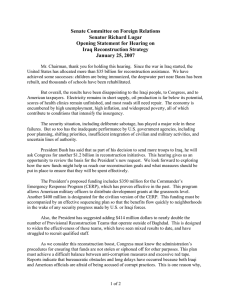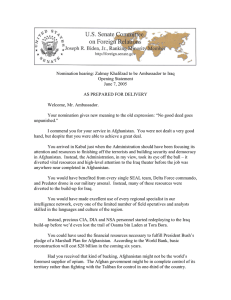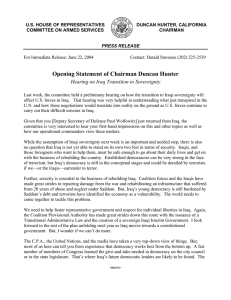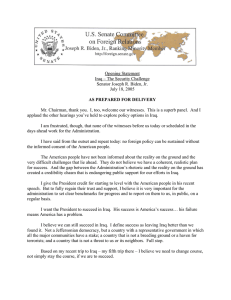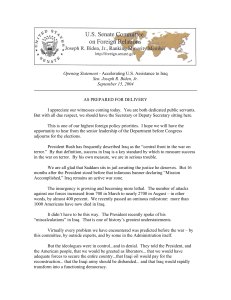Opening Statement Accelerating Economic Progress In Iraq Joseph R. Biden, Jr.
advertisement
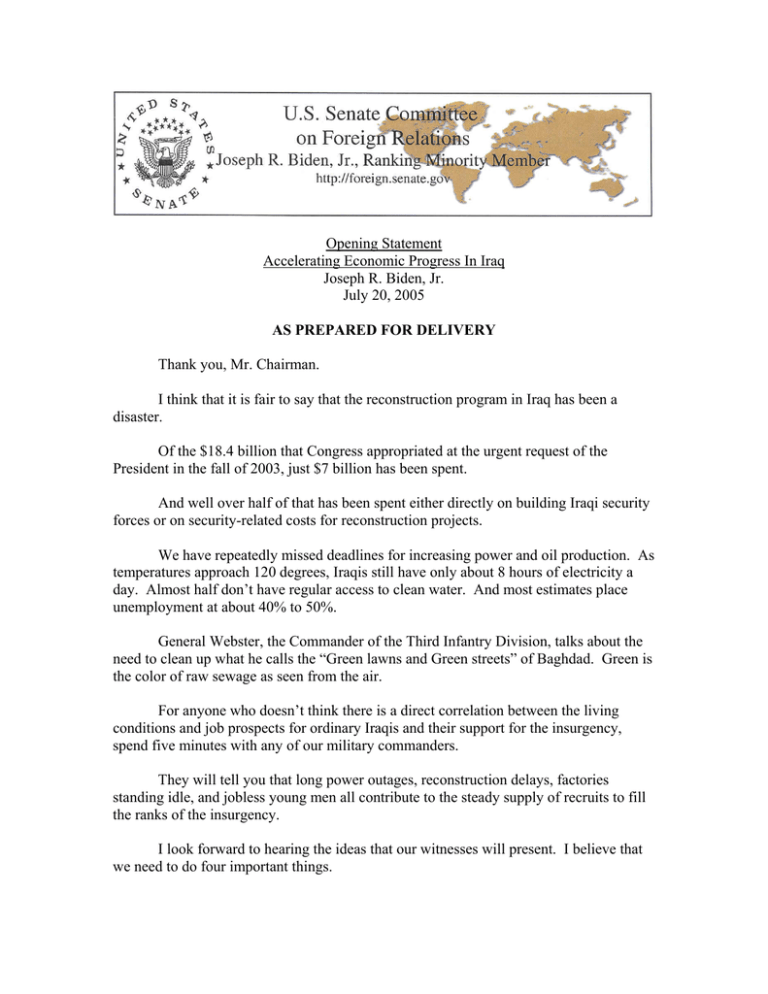
Opening Statement Accelerating Economic Progress In Iraq Joseph R. Biden, Jr. July 20, 2005 AS PREPARED FOR DELIVERY Thank you, Mr. Chairman. I think that it is fair to say that the reconstruction program in Iraq has been a disaster. Of the $18.4 billion that Congress appropriated at the urgent request of the President in the fall of 2003, just $7 billion has been spent. And well over half of that has been spent either directly on building Iraqi security forces or on security-related costs for reconstruction projects. We have repeatedly missed deadlines for increasing power and oil production. As temperatures approach 120 degrees, Iraqis still have only about 8 hours of electricity a day. Almost half don’t have regular access to clean water. And most estimates place unemployment at about 40% to 50%. General Webster, the Commander of the Third Infantry Division, talks about the need to clean up what he calls the “Green lawns and Green streets” of Baghdad. Green is the color of raw sewage as seen from the air. For anyone who doesn’t think there is a direct correlation between the living conditions and job prospects for ordinary Iraqis and their support for the insurgency, spend five minutes with any of our military commanders. They will tell you that long power outages, reconstruction delays, factories standing idle, and jobless young men all contribute to the steady supply of recruits to fill the ranks of the insurgency. I look forward to hearing the ideas that our witnesses will present. I believe that we need to do four important things. 2 First, we must establish realistic goals and make clear what we’re doing to overcome the shortfalls. For example, the goal was to generate 6000 megawatts of electricity in Iraq by last summer. Today, we’re at just over 4000 megawatts. But demand is nearly twice that and we’ve scaled back our goal to 5500 megawatts by December. The administration said oil would pay for Iraq’s recovery. Yet Iraq is still falling some 750,000 barrels a day short of the target of 3 million per day. At current prices, that’s a shortfall of $10 billion a year. Second, we must have accurate measures of the delivery of essential services if we want to know what difference reconstruction is making. Third, we must focus resources on smaller projects that make an impact in the lives of ordinary Iraqis. Most Iraqis are simply looking for an improvement in their standard of living, not state-of-the-art infrastructure. A General in Iraq told me that instead of building a tertiary sewage treatment plant, we should be running PCV pipe from people’s backdoors to the river so they don’t walk out their front doors into three feet of sewage. In parallel, we should increase the amount of reconstruction funds given directly to US military commanders -- one of the few success stories in reconstruction. I’ve seen for myself the difference these funds make in giving our commanders a weapon to make Iraqis happier and our troops safer. Fourth, we have to develop the capacity of Iraqi ministries. This is the third Iraqi government in less than two years, and there could be a fourth by the end of the year. We know the difficulty of transitions between Administrations every four years. Imagine the challenge in Iraq when the management team of a barely functional government changes every few months. We have to help the government deal with rising corruption, which is badly eroding public confidence. And we must press our allies to help train Iraqi personnel. The British have proposed partnering individual countries with a cluster of Iraqi ministries. We should follow up on this idea. There is a direct correlation between Iraqis supporting their government and children going to school, men and women going to jobs, sick people having a doctor, 3 families getting the electricity they need to stay cool, and police protecting citizens from robberies and kidnapping. In short, if the economy and reconstruction don’t succeed, it’s difficult to imagine the insurgency being defeated. I look forward to the testimony.


